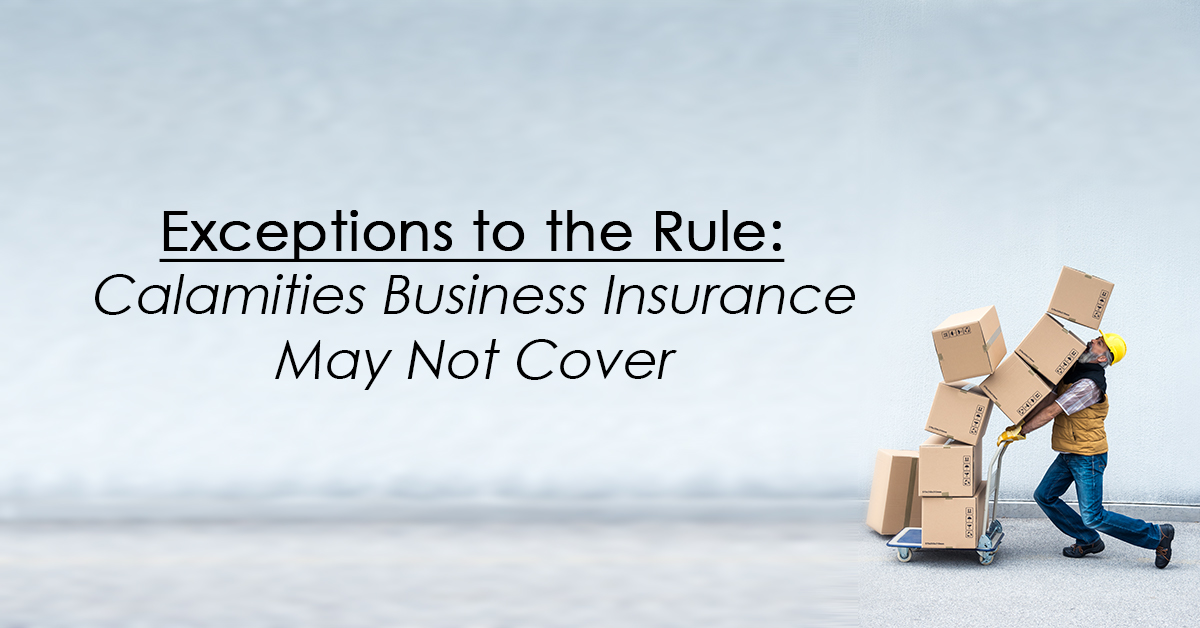Exceptions to the Rule: Calamities Business Insurance May Not Cover

Exceptions to the Rule: Calamities Business Insurance May Not Cover
Recent events across the country and the world have created lively discussions about business insurance and what may or what may not be covered. Much of this discussion is centered around Business Interruption Insurance.
It can be helpful to understand that virtually every form of insurance has exclusions, limitations, or will require a separate policy or additional rider on the main policy to cover certain circumstances. With homeowners’ insurance, for example, damage from flooding is not covered under the basic policy but must be secured separately. Likewise, backyard trampolines will likely not be covered by homeowners’ insurance and may even invalidate a homeowners’ insurance policy. There are other examples as well both in consumer and business insurance.
Business interruption insurance generally covers financial losses due to physical damage to a business or its inventory by a covered calamity like a fire or storm damage. In some cases, financial losses sustained from a loss of business due to a virus like COVID-19 would be exempt from coverage.
On the other hand, if a business has sustained damage due to rioting and is forced to close their doors because of the civil unrest, income losses under a business interruption policy may be covered. Not only would a business be covered under the vandalism provisions of a policy but because there were physical losses, business interruption coverage would also likely be in effect.
Some businesses may have been taken aback by the lack of coverage under some circumstances. It reinforces the importance of an occasional business insurance policy review. Businesses should carefully weigh the benefits of Business Interruption Insurance and understand its limitations. They should, at the very least, understand what is and isn’t covered under a policy and address any gaps they may be uneasy with ahead of time.
If it has been longer than you can remember since your business has had an insurance review, we invite you to contact one of our independent agents. They will discuss your specific risks, concerns and potential solutions. They will then go in search of a policy that suits your needs at a price that you can feel comfortable with. Contact us today.
Do you have questions about your insurance? Find an insurance agent near you with our Agent Finder
Search All Blogs
Search All Blogs
Read More Blogs
South America: Beyond the Basics
Surprising South America: Fun Facts, Hidden Gems, and Unexpected Trivia (You Won’t Believe #7!)
She Means Business: Powerful Women Who Built Billion Dollar empires
Conquering the Corporate Jungle: Inspiring Women-Led Businesses You Should Know (Free Business Insurance Quote!)
Your Life Insurance Policy: A Secret Savings Account?
Don’t Cash Out! Unlock the Hidden Benefits of Your Life Insurance Policy (Free Quote Included!)
Don’t Be a Drain! The Essential Fluids Your Car Needs to Flow
Car Care 101: Essential Fluids Explained (Don’t Get Stuck on the Side of the Road!)
How to Maximize Your Chances of Getting Your Security Deposit Back
Moving Out? Don’t Leave Your Money Behind! Get Your Security Deposit Back Every Time (and Maybe Even Renters Insurance!)
Garage Sale Gold! How to Turn Trash into Treasure (and Cash!)
Don’t Trash It, Sell It! Pro Tips for a Successful Garage Sale (and Extra Cash!)
Don’t Let Your Business Go Up in Smoke! Top 5 Causes of Commercial Fires (and How to Prevent Them)
Commercial Fire Safety: Protect Your Business from the Top Fire Threats (Free Quote Included!)
Taming the Paper Tiger: How to Keep Important Documents Safe
Don’t Let Your Important Documents Become Disaster Snacks! Safe Storage Tips Inside
A Fun Ride Through Auto Racing History (and How to Save on Insurance!)
Need for Speed: A History of Auto Racing in the US (Plus Save on Car Insurance!)
Dive into Safety: Essential Pool Tips for Fun (and Peace of Mind!)
Poolside Paradise or Potential Peril? Top Pool Safety Tips for Families



















